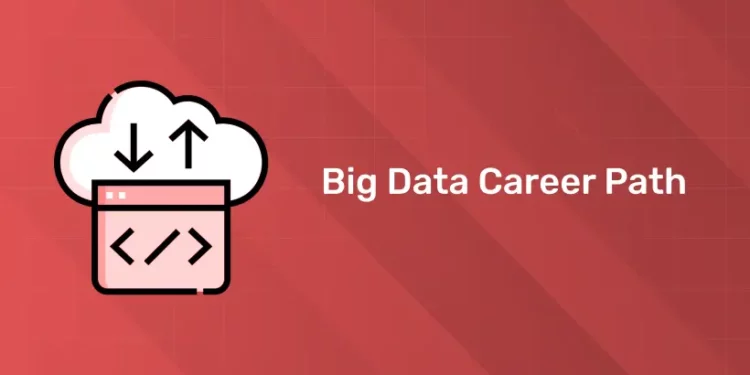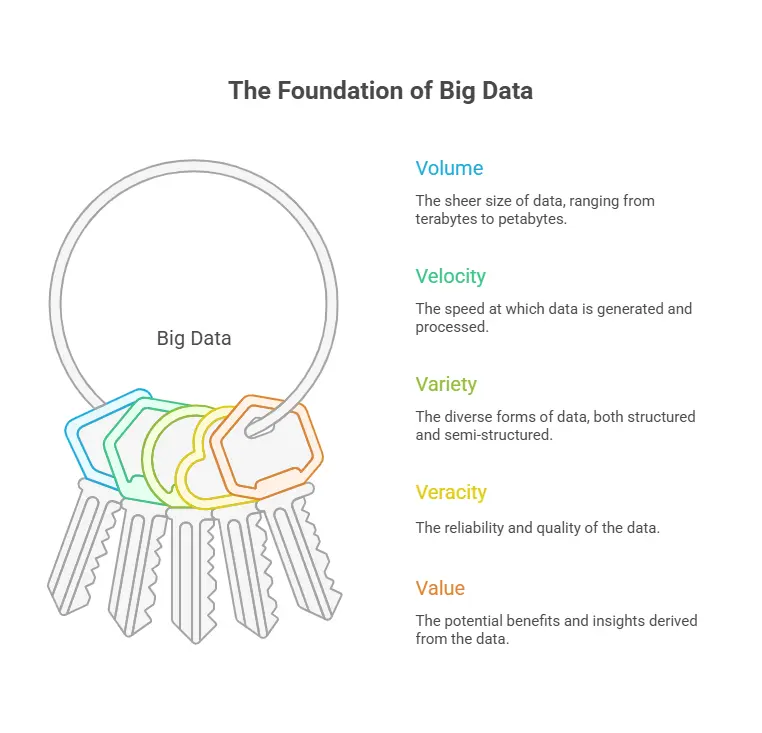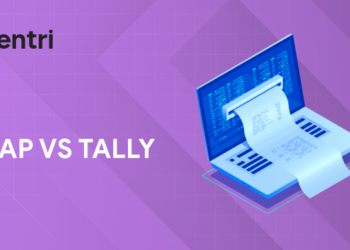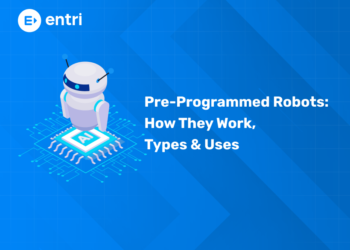Table of Contents
From Netflix suggestions to fraud prevention at the bank, Big Data is making subtle decisions that shape our lives. While businesses in the digital era are gathering huge amounts of data every second—whether it’s customer behavior or IoT sensors—and require professional hands to sift through it all, in come big data professionals.
As businesses are quickly evolving into data-driven giants, Big Data has become an essential business asset. The healthcare sector, finance, retail, and many others are seeking professionals with the capacity to handle enormous complex data sets, process them, and extract valuable insights. Tech-savvy, logical, problem-solver-at-heart persons like you might just hold the golden ticket in the form of a Big Data career.
Enhance your data science skills with us! Join our free demo today!
What is Big Data?
Large datasets that are too complicated for conventional data processing technologies to handle are referred to as “big data.” Size isn’t the only factor; other factors include the data’s variety, speed of flow, value, and reliability. These traits are often referred to as the “5 V’s”:
Volume: Terabytes to petabytes of data, in enormous quantities.
Velocity: The rate at which information is generated, for example, in real time.
Variety: Consists of both structured and semi-structured forms.
Veracity: Reliability and quality of data
Value: The potential benefits and information
Big Data, to put it briefly, is the driving force behind current business intelligence, artificial intelligence, and digital transformation projects.
Why Choose a Career in Big Data?
1: Which of the following algorithms is most suitable for classification tasks?
A job in big data entails entering one of the most exciting and sought-after digital sectors of our time. There is a pressing demand for experts who can transform the massive volumes of data that businesses across sectors gather—from sensor readings to consumer preferences—into insightful knowledge.
The strong need in industries including healthcare, banking, e-commerce, telecom, and government is one of the main justifications for pursuing big data. Big Data provides a variety of professions, from consultants and chief data officers to data analysts and engineers, regardless of your love for statistics, narrative, or system architecture.
Apart from this, the field also provides competitive compensation as organizations compete to attract the best talent with the appropriate competence. Hadoop, Spark, Python, and cloud technology such as AWS and Azure are some of the premium tools and tech specialists can utilize.
LinkedIn’s Emerging Jobs Report says that over the last five years, “Data Scientist” and “Big Data Engineer” have been two of the fastest-growing work titles. Big Data is not only a job choice but also an investment in your work that will pay off in the long run because this growth isn’t going to stop.
🚀 Start Coding Today! Enroll Now with Easy EMI Options. 💳✨
Equip yourself with in-demand skills to land top-tier roles in the data-driven world.
Start Learning Now with EMI OptionsBig Data Career Path
A Big Data career provides you with a structured method for progression from beginner employees to sage leaders. As you progress, the roles are more difficult, but they reward more technologically, in expertise, and financially. Let us walk through the key steps within a Big Data career and the abilities, requirements, and responsibilities associated with each.
Stage 1: Entry-Level Roles
At the beginning, the focus is on building a strong base in manipulating data, describing it, and showing it visually. These jobs are good for recent college graduates or people who want to switch careers and get into the data field.
Typical Job Roles:
- Intern in Big Data
- Junior Analyst of Data
Most Important Duties:
- Collect and clean up data sets
- Make screens and reports
- Look at light patterns and trends.
Skills You Need:
- Excel and SQL
- Simple programming in Python or R
- You can use Tableau, Power BI, or Google Data Studio to show data.
Required Certifications:
- Google Certificate for Data Analytics
- Specialist or Associate in Tableau Desktop
In this case, you need to get hands-on experience. An internship, boot camp, or project work can really raise your image.
Stage 2: Mid-Level Roles
At this stage, professionals start to plan, build, and run Big Data systems. It’s no longer about reports but about tech, statistics, and design.
Job Roles:
- Big Data Engineer
- Associate Data Scientist
- Data Architect
Most Important Duties:
- Put together storage and data paths
- Distributed computing lets you work with and evaluate big information.
- Work with business teams to figure out what info they need.
Skills Required:
- Python, Java, or Scala for programming
- Use Hadoop, Apache Spark, Kafka, and Hive to work with big data.
- MongoDB, Cassandra, and PostgreSQL are databases.
- Cloud providers: AWS, Azure, and GCP
Required Certifications:
- Associate Data Engineer for Microsoft Azure
- Data engineer who is Cloudera Certified Professional (CCP)
- Professional Data Engineer at Google
For mid-level jobs, you need to be able to use technology well and solve problems, and you’ll probably be working with real-time data import and advanced data modeling.
Stage 3: Advanced Roles
Now you’re at the intersection of machine learning, data engineering, and business strategy. Technical skills and domain knowledge are required in such positions.
Typical Job Roles:
- Senior Data Scientist
- Big Data Solutions Architect
- Machine Learning Engineer (Big Data Specialty)
Core Responsibilities:
- Create predictive models and AI-driven solutions
- Design scalable, fault-tolerant Big Data architectures
- Manage cross-functional teams and mentor junior colleagues
Skills Required:
- Distributed systems, deep knowledge of
- Machine learning, deep learning, NLP expertise
- Data governance, security, compliance expertise
- Solid project management and team skills
Required Certifications:
- AWS Certified Big Data – Specialty
- TensorFlow Developer Certificate
Now, it is professionals who are leading the innovation—creating smart systems with real-world influence on customer experience and business performance.
Stage 4: Leadership & Consulting Roles
Leadership professionals articulate the company’s data vision and align it with corporate objectives. It is a suitable role for 10+ years experienced professionals who are technology as well as strategy specialists.
Common Job Titles:
- Chief Data Officer (CDO)
- Data Strategy Consultant
- Director of Data Engineering
Main Responsibilities:
- Develop enterprise-scale data strategies
- Lead big data squads and transformation initiatives
- Develop data usage ethics guidelines and policies
- Close the gap between executive leaders and data teams
Skills & Qualities Required:
- Substantial industry experience and strategic insight
- Effective leadership, communication, and stakeholder relationship skills
- Capacity to lead major digital transformation programs
These positions involve balancing technical expertise and business savvy and usually entail speaking at conferences, policy advising, or even shaping national data programs.
Big Data Career Ladder Overview
| Stage | Typical Roles | Skills & Tools | Certifications |
|---|---|---|---|
| Entry-Level | Big Data Intern, Junior Analyst | Excel, SQL, Python, Tableau | Google Data Analytics, Tableau Associate |
| Mid-Level | Data Engineer, Data Architect, Assoc. Scientist | Hadoop, Spark, Kafka, NoSQL, Cloud Platforms | Azure Data Engineer, Cloudera, Google Data Engineer |
| Advanced | Sr. Data Scientist, Solutions Architect, ML Engineer | ML, NLP, TensorFlow, Data Governance | AWS Big Data Specialty, TensorFlow Developer |
| Leadership | CDO, Director of Data Engg., Strategy Consultant | Strategy, Data Ethics, Business Acumen | N/A (Experience + Executive Programs Preferred) |
Enhance your data science skills with us! Join our free demo today!
Industry-Wise Demand for Big Data Experts
Big Data skills are no longer the exclusive domain of technology firms—it’s a common requirement for all sectors that want to become data-oriented. Whether lives are being saved or dollars, Big Data is leading the charge in redefining business and strategy.
In healthcare, Big Data is used to perform predictive analysis to predict disease outbreaks, enhance the diagnosis rate, and adjust treatment schedules. It is applied in finance to simulate risk, detect fraud, and conduct algorithmic trading. Retailers use Big Data to study consumer behavior, maximize stocks, and personalize advertising. Even the government utilizes Big Data in planning smart cities, traffic control, and monitoring public security.
Important facts:
NASSCOM says that India will need more than 1.5 million data workers by 2026.
Statista says that by 2029, the world’s trade in Big Data and analytics will reach $655 billion.
Based on LinkedIn’s 2024 Emerging Jobs study, these are some of the ten most sought-after jobs in the world. Because it is used in so many fields, big data is one of the best and most stable jobs out there right now.
Skills Required for a Successful Big Data Career
To be successful in a Big Data profession, technical skills must be blended with soft skills. The following is a structured analysis:
| Category | Skills / Tools |
|---|---|
| Programming | Python, Java, Scala |
| Big Data Tools | Hadoop, Apache Spark, Hive, Kafka |
| Databases | SQL, NoSQL (MongoDB, Cassandra) |
| Cloud Platforms | AWS, Microsoft Azure, Google Cloud Platform (GCP) |
| Data Processing | ETL tools, Data Warehousing (e.g., Redshift, BigQuery) |
| Machine Learning | TensorFlow, PyTorch (for advanced roles) |
| Soft Skills | Problem-solving, Analytical thinking, Communication, Business understanding, Team collaboration |
🚀 Start Coding Today! Enroll Now with Easy EMI Options. 💳✨
Equip yourself with in-demand skills to land top-tier roles in the data-driven world.
Start Learning Now with EMI OptionsAverage Salaries for Big Data Roles
Here’s a snapshot of average salaries for key Big Data roles based on experience levels in India and the United States:
| Role | Experience | Avg Salary (India) | Avg Salary (US) |
|---|---|---|---|
| Data Analyst | 0–2 years | ₹5–8 LPA | $60,000–$90,000 |
| Data Engineer | 3–5 years | ₹10–18 LPA | $100,000–$130,000 |
| Data Scientist | 5–8 years | ₹18–30 LPA | $120,000–$150,000 |
| CDO / Director | 10+ years | ₹40 LPA and above | $180,000+ |
Final Thoughts
A Big Data career is not a matter of numbers—it’s about uncovering insights that create innovation and enhance people’s lives. As data becomes the cornerstone of business, industry, and government decision-making, demand for skilled professionals expands. From inquiring beginner to leadership roles, Big Data has diversity, leading-edge tools, and strong pay. The worth lies in learning on a continuous basis, remaining current with the latest technology, and possessing technical and business ability. If you wish for a future-proofed, fascinating, and fulfilling profession, then Big Data is the one for you.
Enhance your data science skills with us! Join our free demo today!
🚀 Start Coding Today! Enroll Now with Easy EMI Options. 💳✨
Equip yourself with in-demand skills to land top-tier roles in the data-driven world.
Start Learning Now with EMI OptionsFrequently Asked Questions
Do I need a technical background to work in Big Data?
While many roles require technical skills, there are also non-technical roles such as Data Strategy Consultant or Business Analyst where domain knowledge and communication skills are equally important. However, a basic understanding of data concepts is beneficial.
What’s the difference between a Data Scientist and a Big Data Engineer?
-
A Big Data Engineer builds and manages data pipelines, systems, and storage.
-
A Data Scientist analyzes that data using statistical models, machine learning, and visualizations to generate insights.
Is Big Data a good career in 2025 and beyond?
Yes, Big Data continues to be one of the fastest-growing tech domains. With companies increasingly relying on data-driven decisions, roles in data analytics, engineering, and data science are in high demand across industries.
Can a fresher start a career in Big Data?
Absolutely. Many freshers begin with internships or entry-level roles like Junior Data Analyst. With the right skills in SQL, Python, and data visualization tools, plus certifications like Google Data Analytics, freshers can build a solid foundation.













